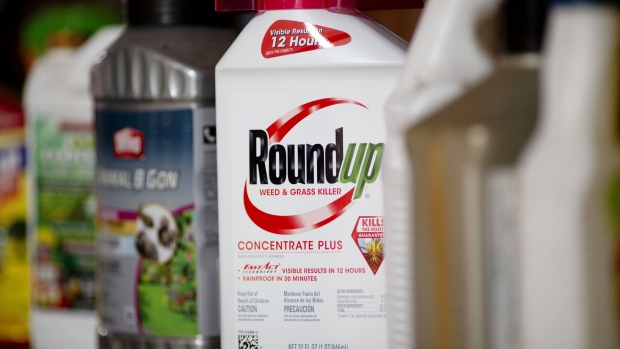Jan 29, 2024
Bayer Slumps After $2.25 Billion Roundup Trial Loss
, Bloomberg News

(Bloomberg) -- Bayer AG shares slumped after the German conglomerate was ordered to pay about $2.3 billion to a former Roundup user who blamed the weed killer for his cancer.
The verdict by a Philadelphia jury is the largest so far in five years of litigation over the herbicide. The stock fell as much as 5.7% in Frankfurt trading, and it’s down almost 70% since Bayer acquired Roundup’s maker Monsanto in 2018.
The ruling is a blow Chief Executive Officer Bill Anderson’s efforts to persuade investors that he can revive Bayer’s fortunes. The Texas native has spent months reviewing options for how to increase value at the company, which has separate divisions devoted to pharmaceuticals, consumer health and agriculture.
Anderson has said he’s considering all options for the future, but his team is leaning against breaking up the three-legged business model for now, Bloomberg reported earlier this month.
Instead, Anderson is focusing on cutting out layers of bureaucracy and speeding up decision-making.
The Roundup litigation, which Bayer inherited with the $63 billion Monsanto acquisition, is a major impediment to change. The company has repeatedly failed to put a lid on its herbicide troubles, including after it pledged to spend as much as $16 billion to put the litigation behind it.
Dividend Concerns
Other challenges include paying down high levels of debt and figuring out how to grow the pharma division in coming years when two blockbuster medicines lose patent protection. Analysts said Bayer may need to review its dividend policy soon to unlock cash.
“Recent trial losses could potentially lead management to favor a more stringent dividend policy, ranging from lowering the payout band to a potential suspension,” Thibault Boutherin and colleagues at Morgan Stanley wrote in a note to clients.
Jurors in a state court in Philadelphia Friday awarded John McKivison $250 million to compensate for his losses and $2 billion in punitive damages over his claims that years of using Roundup at work and at home caused his cancer. The 49-year-old was exposed to Roundup when he worked as a landscaper, according to evidence in the case.
Bayer Appeal
The verdict “conflicts with the overwhelming weight of scientific evidence,” Bayer said. The company argues the product is safe. It said it has “strong arguments on appeal to get this verdict overturned and the unconstitutionally excessive damage award eliminated or reduced.”
While the jury award will likely be reduced, this verdict could be more challenging than past ones because of the high level of compensatory damages, according to Bloomberg Intelligence.
It could also make it more difficult — and more expensive — to resolve the remaining 40,000 or so Roundup cases that are still outstanding in the US. Bayer is also facing litigation over other Monsanto products, especially PCB contamination.
The toll of those legal problems constrains Anderson’s room for maneuver.
With so much uncertainty over how much the legal problems will ultimately cost, it’s hard to consider separating Bayer’s crop science division. Meanwhile, if Bayer were to split off the consumer-health unit, unlocking much-needed cash, it could further embolden plaintiff attorneys in the US to ratchet up their legal fights.
Bayer’s Monsanto unit has won 10 of 16 Roundup trials recently, but the cases it has lost include a $1.5 billion verdict in Missouri handed down in November to three ex-users of the herbicide. The division faces its next trial early next month in a state court in Delaware.
--With assistance from James Cone.
(Updates with CEO’s turnaround efforts in third, fourth paragraphs)
©2024 Bloomberg L.P.


